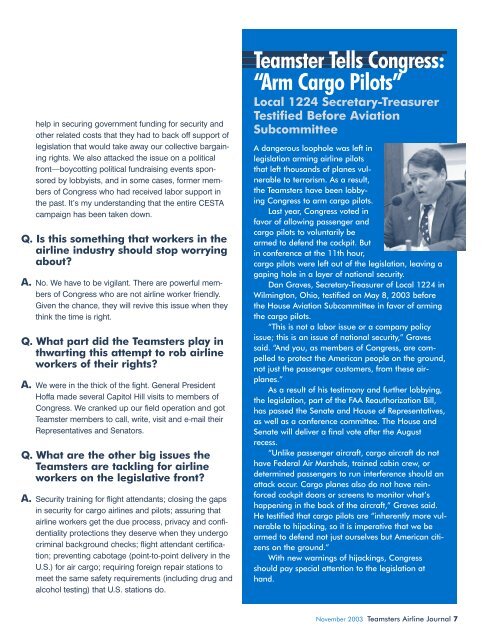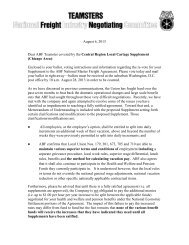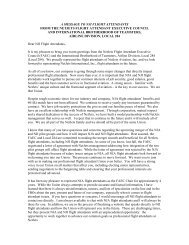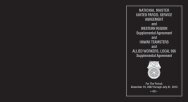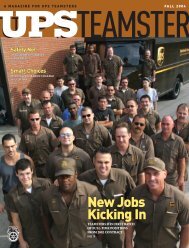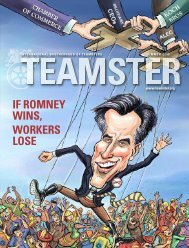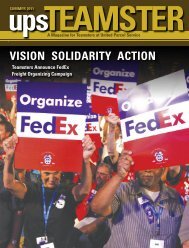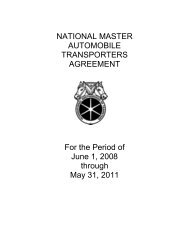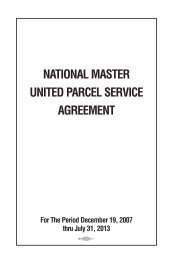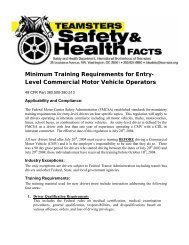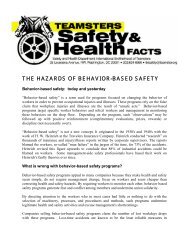October 2003 - International Brotherhood of Teamsters
October 2003 - International Brotherhood of Teamsters
October 2003 - International Brotherhood of Teamsters
Create successful ePaper yourself
Turn your PDF publications into a flip-book with our unique Google optimized e-Paper software.
help in securing government funding for security and<br />
other related costs that they had to back <strong>of</strong>f support <strong>of</strong><br />
legislation that would take away our collective bargaining<br />
rights. We also attacked the issue on a political<br />
front—boycotting political fundraising events sponsored<br />
by lobbyists, and in some cases, former members<br />
<strong>of</strong> Congress who had received labor support in<br />
the past. It’s my understanding that the entire CESTA<br />
campaign has been taken down.<br />
Q. Is this something that workers in the<br />
airline industry should stop worrying<br />
about<br />
A. No. We have to be vigilant. There are powerful members<br />
<strong>of</strong> Congress who are not airline worker friendly.<br />
Given the chance, they will revive this issue when they<br />
think the time is right.<br />
Q. What part did the <strong>Teamsters</strong> play in<br />
thwarting this attempt to rob airline<br />
workers <strong>of</strong> their rights<br />
A. We were in the thick <strong>of</strong> the fight. General President<br />
H<strong>of</strong>fa made several Capitol Hill visits to members <strong>of</strong><br />
Congress. We cranked up our field operation and got<br />
Teamster members to call, write, visit and e-mail their<br />
Representatives and Senators.<br />
Q. What are the other big issues the<br />
<strong>Teamsters</strong> are tackling for airline<br />
workers on the legislative front<br />
A. Security training for flight attendants; closing the gaps<br />
in security for cargo airlines and pilots; assuring that<br />
airline workers get the due process, privacy and confidentiality<br />
protections they deserve when they undergo<br />
criminal background checks; flight attendant certification;<br />
preventing cabotage (point-to-point delivery in the<br />
U.S.) for air cargo; requiring foreign repair stations to<br />
meet the same safety requirements (including drug and<br />
alcohol testing) that U.S. stations do.<br />
Teamster Tells Congress:<br />
“Arm Cargo Pilots”<br />
Local 1224 Secretary-Treasurer<br />
Testified Before Aviation<br />
Subcommittee<br />
A dangerous loophole was left in<br />
legislation arming airline pilots<br />
that left thousands <strong>of</strong> planes vulnerable<br />
to terrorism. As a result,<br />
the <strong>Teamsters</strong> have been lobbying<br />
Congress to arm cargo pilots.<br />
Last year, Congress voted in<br />
favor <strong>of</strong> allowing passenger and<br />
cargo pilots to voluntarily be<br />
armed to defend the cockpit. But<br />
in conference at the 11th hour,<br />
cargo pilots were left out <strong>of</strong> the legislation, leaving a<br />
gaping hole in a layer <strong>of</strong> national security.<br />
Dan Graves, Secretary-Treasurer <strong>of</strong> Local 1224 in<br />
Wilmington, Ohio, testified on May 8, <strong>2003</strong> before<br />
the House Aviation Subcommittee in favor <strong>of</strong> arming<br />
the cargo pilots.<br />
“This is not a labor issue or a company policy<br />
issue; this is an issue <strong>of</strong> national security,” Graves<br />
said. “And you, as members <strong>of</strong> Congress, are compelled<br />
to protect the American people on the ground,<br />
not just the passenger customers, from these airplanes.”<br />
As a result <strong>of</strong> his testimony and further lobbying,<br />
the legislation, part <strong>of</strong> the FAA Reauthorization Bill,<br />
has passed the Senate and House <strong>of</strong> Representatives,<br />
as well as a conference committee. The House and<br />
Senate will deliver a final vote after the August<br />
recess.<br />
“Unlike passenger aircraft, cargo aircraft do not<br />
have Federal Air Marshals, trained cabin crew, or<br />
determined passengers to run interference should an<br />
attack occur. Cargo planes also do not have reinforced<br />
cockpit doors or screens to monitor what’s<br />
happening in the back <strong>of</strong> the aircraft,” Graves said.<br />
He testified that cargo pilots are “inherently more vulnerable<br />
to hijacking, so it is imperative that we be<br />
armed to defend not just ourselves but American citizens<br />
on the ground.”<br />
With new warnings <strong>of</strong> hijackings, Congress<br />
should pay special attention to the legislation at<br />
hand.<br />
November <strong>2003</strong> <strong>Teamsters</strong> Airline Journal 7


